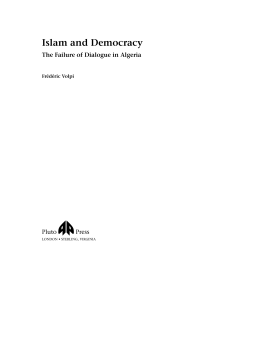
Additional Information
Book Details
Abstract
During the late twentieth century, many authoritarian Islamic states underwent a dramatic transition to democracy. This book examines the process of democratic reform in Islamic countries, the problems it throws up and the cultural ideas and practices that prevail.
Concentrating in particular on Algeria, and based on extensive on-the-ground research, Volpi offers a unique insight into the political history of the Algerian conflict and raises serious questions about the relationship between Islam and democracy on an international level. Addressing the problem of the radicalisation of political Islam in the region, he suggests possible solutions to the security and foreign policy dilemmas linked to international terrorism.
A bitter battle has been fought between the civil state and the Islamic fundamentalists in Algeria since the 1980s. It's a paradigmatic 'clash of civilisations' for some, whilst for others it's a distorted and local crisis in which 'democratisation' was introduced in a deeply authoritarian context. Looking in particular at the role of oil resources, which give Algeria great international geostrategic and economic importance, Volpi explores Algeria's political transition, a story which continues to have immense potential significance for other non-democratic Muslim countries.
'Masterfully situates the obstacles to democratisation in the local negative understandings of elite responsibilities and citizen rights'
James Piscatori, Oxford Centre for Islamic Studies
'There could hardly be a more inflammatory political topic at present ... Volpi [has produced] a really valuable work on the subject'
Professor John Dunn, Cambridge University
Table of Contents
| Section Title | Page | Action | Price |
|---|---|---|---|
| Contents | v | ||
| Preface and Acknowledgements | vii | ||
| 1 Understanding Political Democratisation at the Beginning of the Twenty-first Century | 1 | ||
| Algeria and the third wave of democratic transitions | 1 | ||
| Islam and the 'West': a clash of ideologies in Algeria | 7 | ||
| New political actors for a new international order | 12 | ||
| 2 Political Ideas and Practices in Historical Perspective | 19 | ||
| Genealogies of state power: colonial experiences, post-colonial dilemmas | 19 | ||
| Historical perspectives on Islamic fundamentalist ideology: a pragmatic account | 26 | ||
| 3 The Algerian Political Transition: Democratic Symbols and Authoritarian Practices (1988-91) | 37 | ||
| The 1988 October riots: the symbol of a new era | 38 | ||
| The Algerian democratic transition: successes and failures | 45 | ||
| 4 The 1992 Coup d'État and Beyond: War as Politics Through Other Means (1992-94) | 55 | ||
| The 1992 coup d'état | 55 | ||
| The military in control: the repressive option | 62 | ||
| The Islamic movement: from political opposition to 'holy' war | 67 | ||
| 5 A New Authoritarianism: Guided Democracy Versus Radical Islam (1995-2000) | 72 | ||
| The recomposition of the political field | 72 | ||
| Electoral marketing: formal representation and informal authoritarianism | 75 | ||
| On the margins of politics: the military and the Islamic guerrillas | 83 | ||
| 6 A Civil Society in Transition: Survivalist Strategies and Social Protest | 93 | ||
| Coping with violence and deprivation: survivalist strategies | 93 | ||
| The articulation of social protest: defying the regime | 99 | ||
| 7 The International Arena: Strengths and Weaknesses of the New World Order | 110 | ||
| The political economy of the conflict: the role of international actors | 110 | ||
| Algeria as the future of democratisation in the Muslim world | 116 | ||
| Exporting the jihad: the internationalisation of radical Islamic actors | 123 | ||
| 8 Conclusion: Learning and Unlearning to be Democratic | 128 | ||
| Notes | 138 | ||
| References | 156 | ||
| Index | 164 | ||
| Abdelkader, Emir, 20 | 20 | ||
| Abdessallam, Belaid 111-12 | 111 | ||
| Abdessallam, Belaid, 64 | 64 | ||
| Abduh, Muhammad 27-31 | 27 | ||
| 27-31 | 27 |
